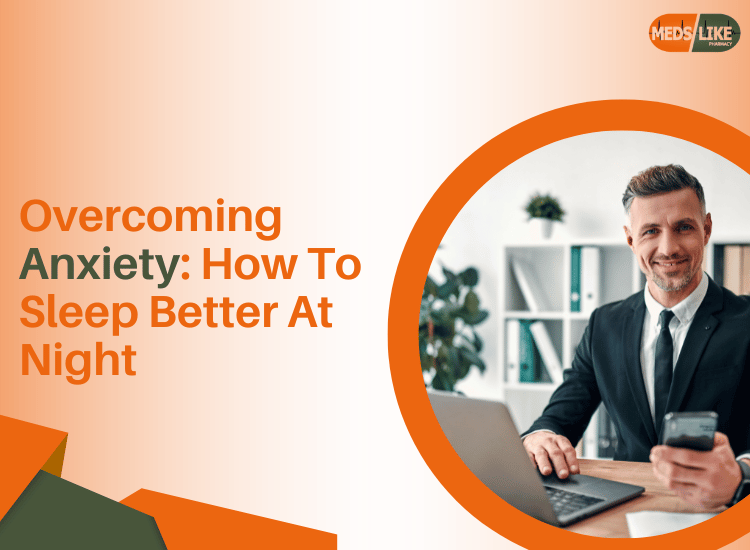Anxiety is a natural response to stress, but when it becomes overwhelming or persistent, it can interfere with daily life. Getting a good night’s sleep is essential for our physical and mental well-being. But for those struggling with anxiety, falling and staying asleep can feel impossible. Anxiety can create a vicious cycle—poor sleep increases stress levels, and heightened stress makes sleep even harder to achieve.
If you find yourself lying awake at night, consumed by racing thoughts or waking up frequently with restlessness, you’re not alone. The good news is that you can break free from this cycle. By understanding the connection between anxiety and sleep and implementing effective strategies, you can reclaim restful nights.
In this blog, we’ll explore why anxiety affects sleep, practical techniques to calm your mind, and long-term habits for better sleep hygiene.
How Anxiety Affects Sleep
Anxiety is the body’s natural response to stress, but when it becomes overwhelming, it can interfere with sleep patterns. Here’s how:
1. Racing Thoughts and Overthinking
Anxiety often leads to an overactive mind, causing excessive worry about past mistakes, future events, or even minor daily concerns. This mental overload makes it difficult to relax enough to drift into sleep.
2. Increased Heart Rate and Restlessness
When you’re anxious, your body activates the “fight-or-flight” response, increasing heart rate and muscle tension. This physiological state is the opposite of what your body needs to enter deep sleep.
3. Nighttime Panic Attacks
Some individuals experience nocturnal panic attacks—intense episodes of anxiety that wake them up in the middle of the night. These can leave you feeling exhausted the next day.
4. Insomnia and Frequent Waking
Anxious thoughts can prevent you from falling asleep, while subconscious stress may cause frequent nighttime awakenings, leading to fragmented and unrefreshing sleep.
10 Ways to Sleep Better Despite Anxiety
If anxiety keeps you up at night, try these science-backed strategies to calm your mind and prepare your body for restful sleep.
1. Create a Calming Bedtime Routine
A consistent nighttime routine signals to your brain that it’s time to wind down. Try incorporating:
- A warm bath or shower to relax muscles
- Light stretching or yoga to release tension
- Reading a book (avoid screens)
- Journaling to release anxious thoughts before bed
2. Limit Screen Time Before Bed
Screens emit blue light, which suppresses melatonin—the hormone that helps regulate sleep. Avoid scrolling on your phone, watching TV, or working on your computer at least one hour before bedtime.
If you must use screens, enable night mode or wear blue-light-blocking glasses.
3. Try Breathing Exercises and Meditation for Anxiety
Deep breathing and mindfulness can activate the body’s relaxation response, lowering heart rate and reducing anxious thoughts. Try:
- 4-7-8 breathing: Inhale for 4 seconds, hold for 7 seconds, exhale for 8 seconds.
- Progressive muscle relaxation: Tense and relax each muscle group in your body.
- Guided meditation: Use apps like Calm, Headspace, or Insight Timer to help you unwind.
4. Reduce Caffeine and Alcohol Consumption
Caffeine can stay in your system for up to 6 hours, making it harder to fall asleep. Try switching to herbal teas like chamomile or peppermint in the evening.
While alcohol may initially make you drowsy, it disrupts sleep quality and causes nighttime awakenings. Opt for warm milk or decaffeinated herbal drinks instead.
5. Keep Your Sleep Environment Comfortable
Your bedroom should be a relaxing, sleep-friendly zone. Make these adjustments:
- Keep the room cool (around 60-67°F or 16-19°C)
- Use blackout curtains to block light
- Eliminate noise with white noise machines or earplugs
- Invest in a comfortable mattress and pillows
6. Manage Stress With Journaling
Writing down your thoughts before bed can help you process emotions and clear your mind. Try:
- A worry journal: Write down anything that’s bothering you.
- Gratitude journaling: List three things you’re grateful for each night.
- To-do lists: Write down what needs to be done tomorrow to prevent overthinking.
7. Exercise Regularly (But Not Too Late)
Regular exercise helps reduce anxiety and improve sleep. However, avoid intense workouts close to bedtime, as they may energize you. Instead, opt for:
- Morning or afternoon workouts
- Evening walks
- Gentle yoga before bed
8. Use Aromatherapy and Natural Remedies for Anxiety
Essential oils like lavender, chamomile, and sandalwood promote relaxation. Try:
- Diffusing essential oils in your bedroom
- Spraying lavender mist on your pillow
- Using scented lotions or bath oils before bed
Herbal remedies like valerian root, magnesium, and melatonin supplements can also help with sleep. Always consult a doctor before taking new supplements.
9. Stick to a Consistent Sleep Schedule
Going to bed and waking up at the same time every day (even on weekends) helps regulate your internal clock. Inconsistent sleep patterns confuse your body and can worsen insomnia.
If you need to adjust your sleep schedule, do so gradually by shifting bedtime 15-30 minutes earlier each night.
10. Seek Professional Help If Needed
If your anxiety is severe or causing chronic sleep issues, a therapist or doctor can help. Treatment options include:
- Cognitive Behavioral Therapy for Insomnia (CBT-I): A specialized therapy designed to improve sleep.
- Medication: In some cases, anti-anxiety or sleep aids may be prescribed.
- Stress management techniques tailored to your specific triggers.
Breaking the Anxiety-Sleep Cycle for Good
Overcoming anxiety-related sleep struggles doesn’t happen overnight, but small, consistent changes can make a big difference. Start by implementing one or two strategies from this list and gradually build a personalized nighttime routine that works for you.
Final Takeaway:
Prioritize a calming bedtime routine
Reduce screen time, caffeine, and alcohol
Practice deep breathing and meditation
Make your sleep environment comfortable
Seek help if anxiety significantly impacts your sleep
Your mind and body need rest to function at their best. By managing anxiety effectively, you can finally get the sleep you deserve—one peaceful night at a time.

